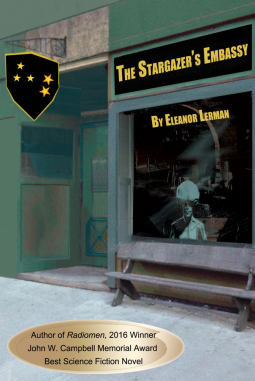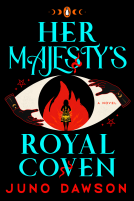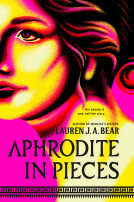
The Stargazer's Embassy
by Eleanor Lerman
This title was previously available on NetGalley and is now archived.
Send NetGalley books directly to your Kindle or Kindle app
1
To read on a Kindle or Kindle app, please add kindle@netgalley.com as an approved email address to receive files in your Amazon account. Click here for step-by-step instructions.
2
Also find your Kindle email address within your Amazon account, and enter it here.
Pub Date Jul 11 2017 | Archive Date Jul 11 2017
Description
From the 2016
John W. Campbell Prize Winner for Best Science Fiction…
AN EVOCATIVE AND UNEXPECTED TAKE ON THE FRIGHTENING PHENOMENON OF ALIEN ABDUCTION
The Stargazer’s Embassy upends how we think about alien abduction: in this story, it is the aliens who seem fearful of Julia Glazer, the woman they are desperately trying to make contact with.
Violent and despairing after the murder of the one person she loved -- a psychiatrist who was studying abductees -- Julia continues to rebuff the aliens until her relationships with others who have met “the things,” as she calls them (including a tattoo artist, a strange man who can take photographs with the power of his mind, and an abductee locked up in a mental hospital) force her deeper into direct alien contact, and a confrontation about what death means to humans and aliens alike.
Advance Praise
Praise for Eleanor Lerman’s The Stargazer’s Embassy:
"In poet and author Lerman’s skillful and satisfying novel of a very personal alien invasion, shadows may hide enemies or friends, and the greatest dangers come from within oneself. Julia Glazer is content to be a janitor in 1990 New York City; listening to music while she’s working drowns out her constant fears of the alien “things” that often approach her when she’s alone, and puts some distance between her and the memory of her dead UFO-obsessed mother, Laura, who forced Julia into an alien encounter when she was a little girl. When Julia falls for a professor, the subsequent changes in her life bring her face-to-face with how entangled she really is with her fears, her past, the aliens themselves, and the human urge to search for one’s place in the universe. Lerman uses expansive prose and Julia’s potentially unreliable narration to keep the balance shifting between hope and menace. There are no spaceships or laser blasts; Lerman’s tense but thoughtful novel explores the mysteries of the psyche as much as those of outer space, and is fitting for any reader who enjoys deep and subtle stories." – Publishers Weekly (starred review)
"I really liked this novel. It’s wonderfully eerie, mysterious, captivating and thought-provoking. I got pulled into the story right away and thoroughly enjoyed the read. Highly recommended." – Toby Johnson author of The Myth of the Great Secret: An Appreciation of Joseph Campbell
Praise for Eleanor Lerman’s Radiomen:
“As Lerman’s entertaining second novel winds to its conclusion…i’ll leave
readers wondering if there might be life out there.” – Publishers Weekly
“This philosophical novel reflects on physics and cults, analyzing the nature of mysteries.” – Foreword Reviews
“This novel has an inspiring premise and an even better plot. It’s a hybrid between conventional novel and science fiction…Nobel Laureate Doris Lessing once said that science fiction had its second-tier reputation only because so few good writers had attempted the form. Eleanor Lerman, an award–winning poet, is such a first-tier writer.” – New York Journal of Books
“Eleanor Lerman’s odd, compelling novel Radiomen, published by Sag Harbor’s The Permanent Press, can lay claim to showing its author’s skill as a poet… Radiomen may be science fiction, but it’s hardly a predictable or typical example of the genre.” -- Dan's Papers
Marketing Plan
* National consumer print, online and broadcast media campaign *
* Publishing trade ARC/galley outreach *
* Q&A author interviews and excerpts available upon request *
* August 2017 blog tour *
* Influencer outreach to Amazon top reviewers & Goodreads librarians, Bookstagrammers, BookTubers, podcasters, and more *
Available Editions
| EDITION | Paperback |
| ISBN | 9781936419739 |
| PRICE | $18.95 (USD) |
Average rating from 38 members
Featured Reviews
 David M, Reviewer
David M, Reviewer
It's marketed as a science fiction story and of course it is, but it is much more character driven than most, dealing with themes of alienation and loss as a young woman tries to escape from her past and ignore their impact on her life. For much of the story I was unsure whether the events she described were real or existed onluy in her imagination. This becomes clear in the course of the narrative and things start to move with satisfying urgency to a rather unexpected conclusion. It's not my usual sort of read but I thoroughly enjoyed it.
 Reviewer 334942
Reviewer 334942
I absolutely loved this book! What a relief to read a so-called "literary" sci-fi novel that isn't ashamed of being speculative fiction. Lerman resists the hipster temptation so prevalent in literary sci-fi, of keeping an ironic distance. Instead, she dives in and actually takes seriously the question of what it would actually be like to live inside one of the sensational, even lurid, plots that detail encounters with alien beings. And the answer, of course, is that it would be a very difficult life indeed. The style and tone of the book is fairly straightforward psychological realism, and the reason that works is because the realist style ensures that we are not allowed to view Julia's story of lifelong, unwilling engagement with the "things", as she calls them, as a fable or an allegory of modern life or anything as pretentious as that (although it may very well have been the author's intention to make the plot metaphorical in some way). Instead, we are asked to take the plot at face value, to engage however seriously or non-seriously we like with the both profound and intensely fun question of "what would it really be like to be someone, for real, who normally we see just featured in an episode of the X-Files?"
I gave it five stars because it's so unusual, thoughtful and fluidly put together, and it really deserves all the attention it can get - but it's not perfect, of course. The ending felt a bit rushed and pat (after a slightly drawn out middle), and Lerman is a little too fond of certain repeated moments, like the heroine telling herself she's never felt worse than she feels in this very moment. But overall, if you like speculative fiction of all kinds, I urge you to try this book. Hopefully you won't regret it!
 Brad H, Reviewer
Brad H, Reviewer
The Stargazer's Embassy by Eleanor Lerman
My rating: 4 of 5 stars
Thanks to Netgalley for this Arc!
I honestly thought this was going to be a tongue-in-cheek novel based on the cover and even more so because the author is a poet and is pushing this title within literary SF.
What I read was nothing of the sort.
Instead, we get a very grounded and realistic rendition of the alien abduction world from a very strange member within it. She wants nothing to do with any of it. And, oddly enough, she was never abducted, just visited. A lot. There's a mystery here, of course, and Julia is utterly focused on living a perfectly normal life despite her upbringing, submerging herself in distractions and cleaning houses and businesses in the most mindless job she can and endlessly diving into all kinds of music to push the rest of the world away. No close friends or relatives, no desire for anything more... but of course everything changes.
I'm very impressed by this novel more because of its invested realism and honest reactions and the way its skeptical of sensationalism. Instead, we've got a novel that takes everything very seriously and backs it up with deep character development, wonderful details, and genuine outrage, antagonism, and fear.
In the respect that it writes clearly and fascinatingly about a sensational subject while always remaining firmly grounded and thoughtful, this is a literary novel. Only the subject itself is SF, but that's happening all the time, nowadays, as ideas become super-mainstream.
I totally recommend this for everyone in the mood for an extended and deeply explored X-File or that wonderful Spielberg adventure, Taken. This book is all about turning the alien legend on its head and giving the other side a chance to develop as much more than a conspiracy or a joke.
And even more importantly, it was a simple delight to read. :)
 bonnie s, Librarian
bonnie s, Librarian
Fabulous! Great world building, loving the characters, will be looking for more by this author!
 Jennifer W, Reviewer
Jennifer W, Reviewer
Even if aliens are not really your thing, you should absolutely give this book a try. Lerman manages to take a rather nutty plot device - alien visitation - and deliver it with poignancy and, at times, exquisite beauty.
 Jesse H, Reviewer
Jesse H, Reviewer
In 2015, Eleanor Lerman’s career in writing took what some might frame as an abrupt left turn: aliens. Known primarily for her poetry, Lerman had only one novel and two collections of short stories to her name, none of which breached known reality (at least for non-conspiracy thinkers). With The Radiomen, however, Lerman told the story of an everyday woman who as a child had a strange encounter with an alien through her uncle’s shortwave radio, then developed the scene into a story revolving around religion and self-awareness. The premise apparently ripe, in 2017 she returns to novel-length fiction about equivocal extra-terrestrials in the human context with Stargazer’s Embassy (Mayapple Press).
Julia is a single, middle-aged cleaning lady living in New York City who seems content with life. Her mother’s train riding off the track most of the time (she tattooed Julia’s wrist as a child with a strange pattern of stars), her passing leaves Julia with some sense of peace. But things may just be repressed. Meeting an older professor of psychology one evening, Julia starts up an unexpected relationship. And things progress normally, that is, until John reveals that a major portion of his research revolves around experiencers—people who have encountered or been abducted by an alien race dubbed ‘the grays.’ Julia is willing to accept this part of his work, but the tattoo on her wrist won’t. The star pattern something commonly observed by experiencers, Julia is forced to delve into her mother’s past as well as the rabbit’s hole of her own soul.
Stargazer’s Embassy, like The Radiomen, is a novel which presents itself very simply; Lerman’s syntax is straight-forward, no teasing, hinting, or over-statement. But from the beginning it’s quite clear an undercurrent of something unearthly flows beneath the surface narrative. Interestingly, it’s not the aliens which occupy this subterranean flow, rather their meaning and purpose to Julia’s story. Building subtle momentum, I kept asking myself: how is Lerman going to resolve this? How do the grays fit into Julia’s life and the world beyond? At one point I even worried: is it all just eye candy—another trope of sf paraded mysteriously for entertainment only? But my fears were misplaced. Lerman draws the strands of narrative together upon the conclusion into a something that has meaning for the characters, and the reader.
I can’t help but point out that, in the face of much contemporary science fiction which is doing it’s darndest to portray “strong women”, “women with agency”, and “revision how women are portrayed in fiction”, Julia is very traditional (for lack of a better word). Along with her job as home cleaner, she is generally a passive woman who comes to be cook, laundry-woman, cleaner, and lover for a man almost twice her age—not precisely the symbol many contemporary feminists are aiming at. More importantly, however, Julia can be indecisive, imposed upon, dishonest with herself, juggled by fate and choice, and is naturally all the more realistic for it. Never a slave or automaton, however, she retains her autonomy despite that she is not kicking ass or enforcing profound opinion on others. Instead, her autonomy is kept through pondering questions and situations, making good and bad decisions, and dealing with family and personal problems in partially inept and not always optimal fashion—just as we do. In a genre with a very vocal portion intent on portraying ‘powerful women’ or even eliminating gender altogether, Julia comes across as a refreshing character precisely for Lerman not defining her by her role in society, rather the facets which comprise her individual character and the highs and lows it traverses living this thing called life.
In the end, Stargazer’s Embassy is an intriguing story for the manner in which Lerman strings out the suspense surrounding the meaning and purpose of the aliens in the context of Julia’s life. Walking a very taught tightrope between realism and science fiction, the reader is kept guessing, right up until the end, as to the reality of her experiences. A strong, emotional story of a woman trying to come to terms with her past and present in the face of uncertainty, Lerman effects a languid but operative writing style; there are details, but the reader must be patient to learn the entire scene. As such, Stargazer’s Embassy is similar to The Radiomen in terms of premise, style, main character, etc.. Quality is also on that list, making the novel equally as recommended.
 Madalina N, Reviewer
Madalina N, Reviewer
Another Netgalley approved early copy, another wonderful author and another unique experience for me.
Let me say I don't usually read science fiction books, let alone alien abduction books, but I requested it anyway and I'm happy I did.
First of all, the plot is tightly woven, though its two parts are split in two, separated by a decade. Or, I could say a ten years cool-off period. Each part builts up to its own resolution, it's fast paced and alert. The second part is deeper, I think, trynig to give a meaning to Julia's life, and to all of our lives as we only have one chance, or because Julia matured.
There are two conflicting stories about aliens (the abductees' ordeal and the exeriencers' mysterious encountes), two leading theories (inter-tribal communication or hybrid population) - both proved true, two realities... At least Julia struggles with all her strengh to remain anchored into the palpable one, but it seems that once you know about "things", you can't stop seeing them everywhere. You can either feel terrorized like Alice, or enraged like Julia.
What I liked the most was the fact that Julia chooses to confront her past, the memory of her mother, the "travelers", to make sense of all that had happened to her. Maybe because her loss is almost painless after so much time, or because she is "alien" to human suffering, her conclusion is that death is nothing, people disappear into nothing, we only have this one chance to make it right. But even if we had infinite chances and keep transgressing, like the travelers, we might feel as lost as they feel, not knowing where they come from and where to go. Her lifelong experience with the travelers prepared her for her mission: to make sure that whoever might come next to Stargazer's Embassy she'll be there, no more running.
Literary soft science fiction
I enjoyed this book. Eleanor Lerman is an excellent writer and the book was hard to put down. As literary fiction, it did a great job of portraying the human condition, but as science fiction it is was disappointing. For most of the book, I could not tell if this was a book about alien experiences or psychiatry. But the question comes down to whether I enjoyed the book or not, and I did. I liked the first-person narrative and I thought the ending (no spoilers) was excellent. I recommend this book for readers who like soft science fiction, but fans of hard science fiction may be disappointed.
 Tanja F, Reviewer
Tanja F, Reviewer
I received an Advanced Reader Copy of The Stargazer’s Embassy by Eleanor Lerman from Netgalley in exchange for an honest review.
The Stargazer’s Embassy is unlike any alien novel written before. Thought provoking and addictive, this is a must read and should be on everyone’s e-reader and book shelf. Judging by the title, what appears to be a quirky cosmic sci-fi novel is actually a rich metaphysical novel that ponders some important existential questions. What really happens after death? What are aliens’ intentions? Can we ever truly escape our past?
The story follows a woman named Julia who finds herself part of an alien conspiracy and wants no part of it. She’s a house-cleaner who is trying to move on from her new-agey childhood and mommy issues. All she has is a tattoo, and a place called The Stargazer’s Embassy, where people come and go, like life itself. We find her at various points in her life struggling with this issue, and trying to make a life for herself. Along the way we are introduced to some interesting characters who find themselves implicated in the very same alien problems she’s trying to escape from.
Julia’s defiance of involving herself in this haunting issue is what makes this a stand out novel. We don’t see Julia enthusiastically throwing herself into the unknown. We see a truly scared, annoyed, and assertive character who becomes the anti-hero. There is a will she or won’t she anticipation that hooks the reader and offers a certain emotional and psychological realism. There are plenty of alien encounters in the novel to satisfy traditional science fiction lovers, but it takes it a step further by offering a multitude of spiritual questions. It is because of this, that The Stargazer’s Embassy becomes an exploration of the meaning of life.
Suffering from emotional abandonment issues, the aliens become a metaphor for Julia’s strange childhood. In essence, she herself is an alien- trying to create a life for herself that she’s never known. Losing her mother with many unanswered questions, Julia hopes her encounters with the aliens, or “things” as she likes to call them, will provide her with the answers she needs. The aliens themselves are not exactly sure what they’re looking for and this in turn becomes a mirror for Julia and other “experiencers” encounters. If we all had the chance to travel throughout the cosmos like the aliens- would any of our questions be answered, or would we be even more confused? Julia spends most of her life searching for answers, but it is the very place she is running away from that provides her with the comfort she seeks- The Stargazer’s Embassy. The aliens have just as many questions as Julia and her friends do, but appreciating life for the journey it is, is all that counts in the end. Everything has a beginning and an end, so rather than spend lifetimes dissecting what it all means, it is important to treasure every waking moment, because it is those moments that stitch the fabric of our lives. There are two things we must do in our lifetime, be born and die. Everything in between is alien compared to the certainty of those two things.
I appreciated the humour associated with the aliens and their un-friendly demeanors. Once again they did not come across as stereotypical menacing superior beings, but relatable drifters who seemed genuinely lost. The story was perfectly paced and the first person narrative was a great way to keep the reader invested in Julia’s journey.
In essence, each of us have our own Stargazer’s Embassy- a place, either imagined or real where we are able to go to find comfort and peace- knowing that the answers we seek, are in fact seeking us. The Stargazer’s Embassy is a place where people- human and inhuman come and go, like life itself.
*A big thank you to Sarah Miniaci at Smith Publicity Inc. for being kind enough to send me a paperback copy to review. You’re friendly correspondence and enthusiasm for this book has me looking forward to reviewing other Smith Publicity Inc. books!
I don't believe I have ever read anything like this book, and it doesn't make it easy to describe it.I thought it was going to be a standard Sci - Fi book and this is a genre I have started fairly recently to read and mostly enjoy.this however was so different to the other books in this genre I have read.,t was very character driven and although it was fairly slow paced it wasn't boring, it showed brilliant imagination and descriptions, it makes me wonder where some authors get their ideas from, it must be wonderful to have all that going in your head and be able to translate it to paper.I liked the main characters and the story and I think if you are looking for something quite different, and well written pull up a seat you've found it.Thank you to the publishers and netgalley for an ARC in return for an honest review.
 Maxine M, Reviewer
Maxine M, Reviewer
As a child living at The Stargazer’s Embassy bar in upstate New York, Julia Glazer’s mother had tried to introduce her to a group of space aliens but she had refused. Even after her mother’s death, Julia continued to resent her for, as she saw it, choosing the aliens over her. Now she works as a cleaning woman in New York, working as many hours as she can get, always with her disc player on to ensure that she is not bothered by these aliens who still seem determined to contact her. But, despite all of her efforts, she finds herself involved first with a Psychologist who believes that aliens are real and whose patients are all abductees and then with the abductees themselves.
The Stargazer’s Embassy by Eleanor Lerman is a beautifully written novel told in the first person by Julia who does not always seem a reliable narrator. The story is divided into two parts. The first is about her efforts to avoid the aliens despite how her life seems to constantly intersect with them. The second part, which begins after a tragedy caused, at least indirectly, by her refusal to admit her relationship with the aliens, is about her efforts albeit very reluctantly to finally discover what it is they want from her.
The novel is certainly about aliens but also the complex relationships between parent and child and within relationships It is also perhaps about how we try to reject realities that don’t fit into our own chosen life narrative and how tragedy and refusal to face it can affect and shape every aspect of our lives…or perhaps not. But the thing about this novel –like all good speculative fiction, it’s the kind of story that raises questions beyond the narrative and makes the reader think long after they have finished reading it.
Thanks to Netgalley and Mayapple Press for the opportunity to read this book in exchange for an honest review
 Susan C, Reviewer
Susan C, Reviewer
I am not usually fond of books on the woo spectrum, but this was quite gripping,with a credible storyline
Please see my full review on Goodreads. I really enjoyed this read. I actually knew very little about the plot when I first started the book and felt that added to my enjoyment. I never knew where it was going and I liked the surprises and suspense. I also thought the author did a great job in telling a paranormal story that was both believable and interesting.. I was glued to the pages and had a hard time putting it down.
Alien abduction/contact is a difficult subject to write about as it has the potential to get cheesie. Kudo's to the author in keeping the plot grounded in reality and using restraint. Would recommend to others who enjoy a good Sci fi read. Thank you to the publisher and Netgalley for an ARC in exchange for an honest review.
 Richard L, Reviewer
Richard L, Reviewer
I was attracted to this book by the title.
Now that is a strange concept I must admit and it was the writing that sustained me. That is equally surprising as it is set in a genre I don't normally read.
I guess where the writing is so good is the establishment of brilliant characters that sustain the story and propel it forward into a page turner.
Julia Glazer is an enigma who has secrets she rarely reveals based on her mother and the disconnect she feels still long after her death. Her mother Laura seemed to have made friends with aliens and this not only has damaged Julia but she still sees them from time to time. Her experiences even recall a time when her mother took her to meet her alien 'friends' and we root for Julia as she recalls the experience as calm and spooky but life changing as a child she had sunk her teeth into alien flesh.
Over time her experience of extra terrestrial beings, is unlike a growing trend of alien abductions which seem much more frightening as physical experiments seem to be conducted on those taken.
Julia falls for John a professor who has taken time out to explore these sightings and abductees. Julia can't bring herself to tell him the truth of her own experiences but in the world of alien encounters she meets some antagonism seemingly centred on her tattoo which is the sign above her mother's bar now run by her 'step-father' Nicky. Opposition grows as some notice her tattoo as a mark of the aliens themselves and brings Julia to question all her mother ever told her.
Story telling at its best, it draws you into a world you want to remain sceptical about. It is thought-provoking and unsettling as you question the role of the alien life forms, their intentions and pre-occupation with Julia.
I like the fact that the aliens are so limited in their abilities to communicate and their analysis of the human race as a whole.
It is a wonderful book about more questions than there are answers, how all life has a quest for information and that concepts such as love can not be bottled or quantified. That life ultimately is about quality not quantity and ideas perhaps should be open and changeable rather than closed and inert.
Julia spends her life shutting things out rather than seeing and believing. How she reaches her own answers mirrors the quest for information the aliens seek, perhaps that is way their lives seem so intertwined. But this is science fiction so all bets are off. There can be a malevolence to these bug like creatures, their purposes dark and against the future of our way of life.
That the authors maintains the tension throughout without corny interjections like take me to your leader ensures this is a thoughtful examination of this subject. That raises the questions about what if we are not alone in our universe and what happens if we are visited first.
 Esther S, Reviewer
Esther S, Reviewer
Before I had even read this book I cycled through an array of reactions.
I love almost anything about space so I was attracted to title but after reading the blurb "explores the frightening phenomenon of alien abduction from a different point of view" I got the sinking feeling that this might be a tale of woe involving probes and UFOs and evidence for why we must believe abductees' stories. Then finally I saw the author was an award winning poet and feared this was just another 'literary' writer aiming to show everyone else how to write sci-fi 'properly'.
I was pleasantly surprised to find that this book was none of those things.
The first third introduces Julia our main protagonist and her developing relationship with John, the kind gentle professor of psychiatry. We learn about the 'things' - aliens who pay her silent visits, wearing comical disguises and staying only until she acknowledges their presence. And then there is Julia's resentment towards her mother who she feels neglected her daughter preferring to spend her time with her 'visitors', the same aliens that now visit Julia.
The situation becomes more complicated when Julia discovers that John's research and therapy work centres on 'experiencers' – people who believe they have been abducted by aliens. Julia still does not reveal to John her connection with aliens but their interaction with the slight cultish group of 'experiencers' lead to a melodramatic crisis and at that point I thought 'Where do we go from here?"
Where the book goes is to follow Julia back into isolation as she recovers from previous events and tries to unravel not just her past but her future. She eventually realizes that running away from life is not the solution and finally confronts her human detractors and the alien visitors in an effort to gain a better understanding of the situation.
I was surprised at how much enjoyed this book.
While the subject matter of aliens and abductions is controversial and a little 'out there' the author avoided hysteria and outlandish extravagance. Although the characters became angry and sometimes violent they behaved in ways that were logical and realistic, believable. Even the aliens had a certain logic to their behavior.
The first third was solid storytelling and through clever portrayal of characters and situations the author manages turn the narrative from a sensationalist account of alien abductions to a sensitive examination of the relationship between Julia and her step-father, the developing relationship between Julia and David and the interactions of the abductees within their own group and with Julia.
But I felt the story was strongest when Julia was on her own. The inner monologues were subtle and restrained and while Julia was sad and lonely she was never became a pathetic or tragic character. In particular the scene between Julia and Agnes seemed realistic and restrained with the characters behaving as they would have to in such a situation.
One of my Goodreads friends was reading a science fiction novel called The Stargazer's Embassy by Eleanor Lerman. I read the description and thought it had potential. So I requested it on Net Galley and received a digital review copy for free via the publisher. I soon had a request to review it from a publicist who gave me a deadline when I agreed. That's why this Net Galley is getting such a quick turnaround.
I want to make it clear that the focus of this novel, alien abductions, is normally a theme that doesn't interest me. I don't believe they happen in the real world and I wouldn't have thought that alien abductions could make a good basis for a science fiction novel. It's a big universe out there. It's hard for me to imagine why spacefaring aliens would be interested in us. The answers that the literature on alien abduction provide seem very unpersuasive and confirm for me that people who claim to be abductees must be very desperate for attention. Yet I wondered if Campbell Award winner Eleanor Lerman had done some fresh thinking on this topic.
Most science fiction writers start by developing their concept. Lerman starts by developing her characters. I have to admit that I initially found protagonist Julia Glazer tiresome and unengaging. I might well have abandoned the book fairly early if I hadn't agreed to review it. Yet over the course of the narrative Julia became more interesting and the decision she made at the end of the book was totally unexpected.
There were also some wonderful characters who we get to meet along the way. There's a compassionate psychiatrist who is studying those who claim to be abductees even though he's been professionally ostracized for trying to help them. There's the tatoo artist who has nothing but scorn for the aliens' tattoos. Then there's also a paranormal photographer who produces images from people's minds. It seemed to me that Julia grew as a character as a result of her relationships with these people.
I read a review of this book on Goodreads that complained about the originality of the aliens. While it's true that there have been aliens who have wanted the same as these aliens, I believe that the nature of this book's aliens is original. Toward the end of this book, I considered Lerman's concept flawed. Yet it eventually occurred to me that she was portraying the aliens as being mistaken. Readers who research the star pattern that they were using to guide them will realize why they weren't finding what they wanted. A species can be very advanced and still be in error about how to attain their goals.
These aliens thought of humans as not having enough common ground with them, but there was a commonality of aspiration. The aliens were looking for something that many human religions are based on. I think it was that shared hunger that caused Julia to make her impulsive decision at the end of this novel.
I confess that I thought Julia was as mistaken as the aliens had been. My reaction when I finished the book was a sarcastic "Good luck with that." Other readers may feel more connected to Julia than I did, and have a totally different perception of this book.
 Bryce O, Reviewer
Bryce O, Reviewer
I enjoy a good pulpy sci-fi story from time to time, and that's about all I expected from The Stargazer's Embassy. What I didn't expect was a very well-written and intelligent piece of speculative fiction that still managed to be a page-turner, much like the over-the-top alien story I had expected it to be.
There are moments when the sci-fi elements threaten to become ridiculous, even silly, but that never kept me from investing myself in the story. In fact, it's surprising to me that an alien abduction book didn't feel ridiculous more often. Eleanor Lerman's excellent writing makes it easy to take this story seriously when necessary, and the complex character of Julia keeps the emotional center of the book grounded, even in the midst of little gray invaders.
The Stargazer's Embassy seems keenly aware of the most important part (in my opinion) of good genre fiction: the authentic human element. A great main character, tone, and sense of pacing turns what could have been a silly, inconsequential alien story into something effective and capable of connecting on an emotional level.
 Katherine R, Librarian
Katherine R, Librarian
An overall enjoyable, well-written book. Not what I expected, but a unique and at times, hard-to-put-down story. I did have some issues with the slow pace and I was thrown off at the end of the first section and the jump forward in time. I enjoyed reading the story arc in the first section and had trouble getting interested in the story again in the second section. The character development was excellent and I loved the writing. I'll be watching for other books by Eleanor Lerman.
Julia is the edgy protagonist who immediately gripped me and pulled me into the start of this one, which pings off the page with tension as we begin to get to know her. The tale slowly unspools as we learn her backstory and why she is constantly alert. Lerman’s depiction of a damaged character whose trust was destroyed during her childhood is very effective. Julia, suspicious and closed off, finds it difficult to bond with anyone and prefers to work as a cleaner alone, so she is able to react quickly whenever she is visited by the things. I found her relationship with John very moving, particularly when she begins to drop her guard and strive for normality. The twist where she discovers what it is he actually does is nicely handled.
However the trouble with her attitude in denying and pushing away the peculiar beings that constantly invade her life, is that the reader is left hanging without any further information about what is actually going on until relatively near the end, which then felt a tad rushed. Julia’s attitude also means that she refuses to discuss situation until she absolutely has to – and even then the conversations are so overlaid with her hostility that she manages to shut down any meaningful discourse, other than the one with Alice, which even then poses more questions than it answers. This means that we don’t have an opportunity to fully engage with the subject on a deeper level, other than as a prop for the story. And initially, this book seemed to promise more.
I love the premise. I thought the setup regarding The Stargazer’s Embassy bar was both plausible and quirky. However the catch in beginning a book with such a strong hook is that it has to keep delivering. If the tension and narrative pace falls away, the reader is left feeling short-changed.
Don’t get me wrong – this is a good book. There is much going for it in the description, the detailed characterisation, the strong supporting cast and atmospheric writing. But after that storming start, I was expecting a great book and because of the story structure, the pacing was too uneven and there wasn’t sufficient opportunity to fully explore the issues raised surrounding the alien abductions. That said, I am still glad I read it and I do recommend it to anyone who has an interest in this subject.
8/10
 Gem L T, Reviewer
Gem L T, Reviewer
Aliens are trying to make contact with Julia Glazer; they have been since her mother died. In an effort to escape them she has left her childhood home, a bar called The Stargazer’s Embassy, and moved to New York. It’s easiest to be safe surrounded by lots of people and plugged into a Walkman so you can’t hear them calling.
There she meets and falls in love with a man who turns out to be completely wrong for her – not in personality, just in occupation. He is a psychiatrist studying people who claim to have been abducted by aliens. Julia at once knows that if she tells him her secret she could move from lover to patient in the blink of an eye. But keeping her secret proves impossible as she begins to meet his patients, and finds amongst them people who describe exactly the aliens she sees. And who recognise the tattoo on her wrist that her mother had scribed there.
I am not the resident Sci-Fi guru here but I found the premise of the book intriguing… and the fact that it was written by someone who’d won an award for a previous Sci-Fi novel reassured me immensely too. But I have to admit that the cover made me think I was making a mistake.
Thankfully you can’t see the cover when you’re reading it! Also thankfully, my copy was on Kindle so no one on the train could see the cover either as I read it on my commute! And thrice thankfully you really shouldn’t judge a book by it’s cover… I really will learn that one day!
Because I really enjoyed this book. It’s a totally different take on the alien abduction genre with a unique, memorable and relatable set of characters. It’s set sometime in the late 90’s but with flashbacks to Julia’s childhood in the 70’s which just adds that cult Sci-Fi feel to it that we all love so well. I don’t want to give too much away so I’ll shut up now but get yourself a copy of this even if you have to slip it inside a different cover to be seen with it!
 Reviewer 407004
Reviewer 407004
Eleanor Lerman’s The Stargazer’s Embassy puts an intriguing tilt on the usual alien encounter narrative. Though here I must admit that apart from a couple Last Podcast on the Left episodes, the X-Files, and Nicole Cliffe’s tweeted account of reading Whitley Streiber’s Communion: A True Story at a perhaps(?) inappropriately young age, I don’t have a significant amount of experience therein. That having been said, rather than a narrative that casts believers against the skeptical norm, the aliens are an accepted fact.
Instead the narrative follows Julia Glazer, a young woman intensely focused on containing herself, controlling her reactions, and moving on predictable auto pilot, whether lifting a wine stain off a celebrity’s couch during work or having a conversation with a striking older man while waiting for a meteor shower to begin. We learn she began maintaining this guarded distance with the world growing up, to keep everyone from learning too much of the truth as to why her late mother was so often found wandering through fields at night.
Occasionally, aliens show up, usually dressed slightly outrageously since they don’t quite grasp the true reasons behind human norms. Julia immediately chases them away, ignoring their piteous moaning. Yet, due to her determination to prevent anyone from touching her, Julia is almost more alien than the extraterrestrials; referring to her work clothes as her “cleaning lady costume” and inhabiting a fairly isolated apartment in an otherwise commercial district. Still, one day she lets her guard down and, in spite of herself, is too interesting–with a strange tattoo and stories of crystal clear skies from her hometown in upstate New York–and too interested. And, well, the rest of the story follows from there–I’d hate to ruin anything.
I really, really enjoyed this book. It’s a compelling, absorbing read that provides a intriguing escape from the rush of the day-to-day. Julia’s closely-held secrets kept me curious and the language was quite lovely as well. I’ll probably reread this at some point, as there are certainly clues, details, and moments I missed the first time through. I suspect this is probably, like Ursula K. Le Guin, speculative fiction for those of us who don’t always love traditional science fiction tropes, and in many ways, it’s a story more concerned with Julia’s relationships to other earthlings than any of the little gray men.
I received a copy of this work from NetGalley in exchange for an honest review.
 Katherine H, Reviewer
Katherine H, Reviewer
I thought the title of this sounded interesting, so I requested it from NetGalley. I'm a real sci fi fan. I was pleasantly surprised to find quite a touching tale of Julia, who has been plagued by alien experiences, whether she's at work or wherever and I get the feeling early on in the book that she just wants a normal life.
Things start to change when she goes to a gathering to see shooting stars...
Before I read the synopsis, I assumed from the title that this would be a book based at some kind of stargazer HQ deep in the galaxy. It was a refreshing change though, to find out that it was very different to other scifi books.
The fact that The Stargazer's Embassy actually turns out to be Julia's grandfather's bar was a nice, if unexpected, touch. The book is peppered with personal touches like this, and that's what increased its appeal for me. The Stargazer's Embassy has a touch of romance in its plot, as Julia meets John, and they begin to hit it off despite their dfferent backgrounds, experiences and opinions.
John is not just any psychiatrist- he says that his patients, or "experiencers," are always talking about alien abduction experiences.
Julia has had her fill of aliens and related experiences through her mother Laura who was barely around for her as a child, instead wandering off and always talking about aliens. This caused a rift and deep-seated anger in Julia, which is still there years after her mother's death. She is very sceptical of anything to do with aliens, She busies herself cleaning houses and listening to any kind of music she can while putting up with a job that pays the bills but that she is less than happy in.
Throughout the book, we are introduced to a cast of varied and well-fleshed-out characters which makes The Stargazer's Embassy an enjoyable read and a very unteresting take on the subject of alien abduction.
The Trekkie in me was impressed with this-it's not often I find a scifi book I enjoy that is not a Star Trek The Next Generation or Voyager book.
The Stargazer's Embassy has great character development and an unusual plot that captured my attention. I really liked Julia as a character in that she seemed determined to live life as she wanted in spite of her upbringing.
That said, The Stargazer's Embassy is a quick, fun read. Thanks to Eleanor Lerman and Mayapple Press for a copy of my ARC.
Readers who liked this book also liked:
Hazel V Carby
Essays & Collections, Multicultural Interest, Politics & Current Affairs
Silvia Moreno-Garcia
Historical Fiction, Literary Fiction, Sci Fi & Fantasy


















